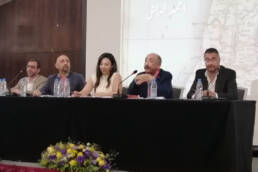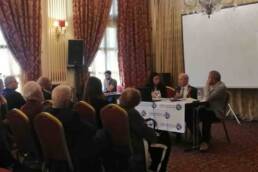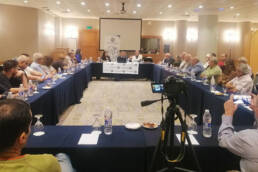The Center for Arab Unity Studies held a digital seminar on the Russian-Atlantic confrontation in Ukraine and International Transformations, on Wednesday, March 2, 2022. The webinar, which lasted about two hours, was presented by the Center’s General Director Luna Abusweireh, and moderated by the Coordinator of the Center’s Policy Analysis Unit Mohamed Ballout. The main speakers in the webinar were Professor at the Lebanese University Jamal Wakim, and the Professor at Cairo University Nourhan Al-Sheikh, in the presence of a large group of academics and interested people.
In her intervention, Dr. Nourhan Al-Sheikh stressed the importance of the military outcome achieved by the Russian forces, saying that “Russia is making accurate calculations because its goal is not to destroy Ukraine, but to destroy the military infrastructure, and it does not want to harm civilians because of the ethnic, cultural and historical relations between the two countries”. She said that the war could have been avoided on two conditions, the first was stopping the Ukrainian attacks on the Donbass region and the displacement of civilians, and the second was reassuring Russia that Ukraine would not join NATO. Instead, she said, “came the talk of Ukrainian President Volodymyr Zelensky about the rearmament of Ukraine with nuclear weapons”.
Dr. Jamal Wakim elaborated on the historical and current reasons for Ukraine’s importance to Russia, quoting the geopolitical thinker Zbigniew Brzezinski in his book “The Great Chessboard” (1997) as saying that Ukraine is “part of the bridgehead that the United States must build to reach the heart of Eurasia”. Wakim explained that Russia, without Ukraine, loses its Eurasian dimension and becomes just a non-global regional power. Therefore, he added that “the United States is working to besiege the Eurasian forces within the Eurasian mainland by expanding NATO to the east to harm Russian national security as well as encouraging minorities to secede from the Russian Federation under the pretext of self-determination”.
Regarding the economic sanctions imposed by the European Union, the United States and Britain, Dr. Nourhan Al-Sheikh explained that Russia has already dealt with a set of sanctions since 2014, which prompted it to develop a special system for dealing between Russian banks and other measures to circumvent the sanctions, including opening up to Chinese, African, Middle Eastern and Latin American markets, so “SWIFT will now have limited impact on Russian banks, but the new sanctions will surely have an effect”, she said.
And Regarding the outcome of the war, Wakim predicted that, after two decades, the center of gravity of the world economy would shift from the North Atlantic to the Indian Ocean. He also added that “because of the imperialist nature of the United States, if it does not remain the number one power in the world, it may not remain united”.
As for the reflection of the crisis on the Arab countries, some participants pointed out to the difference in the Arab position on the war from that of the United States. The Arab systems did not condemn Russia, with the exception of the Lebanese condemnation that came due to American pressure, in addition to Syria’s full support for Russia and the provision of facilities to it.
A group of attendees expressed reservations about the “complete Russian invasion of Ukraine” despite the understanding of Russia’s security reasons, preferring if the military intervention was limited to the Donbass region. Some also called on the Arabs to take lessons from what is happening and work to achieve an Arab union capable of protecting its countries.
You can watch full seminar on our YouTube channel:
مركز دراسات الوحدة العربية
The urgency for the establishment for an Arab Unity as a means of reaching independence, solutions to political and economic turmoil, and the establishment a network of cooperation and mutual assistant-ship among countries of the region.
We appreciate your support
SUPPORT THE CENTRE FOR ARAB UNITY STUDIES
The Centre is reaching out for its friends and readers for support, whether by ordering our publications and paying for them in hard currency, or through donations. The Centre welcomes any support to boost its resiliency, to ensure its survival, the continuation of its legacy and its commitment to tackle issues facing the Arabs and the Arab world.



